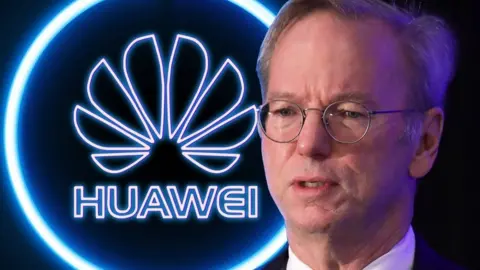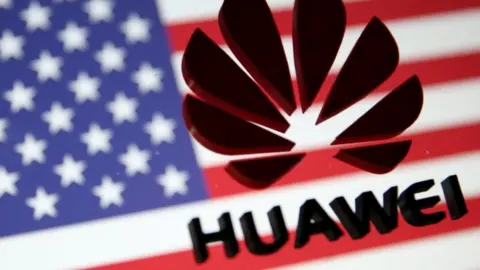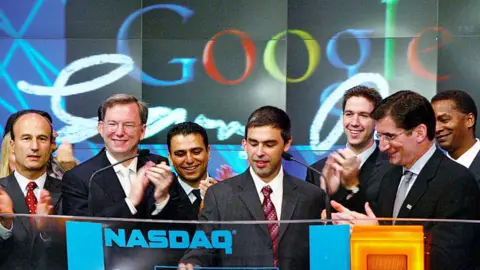Eric Schmidt: Huawei has engaged in unacceptable practices

 Getty Images
Getty ImagesHuawei poses challenges to national security and has engaged in unacceptable acts, Google's former boss Eric Schmidt has told the BBC.
But he says the West should respond by competing with China and its technologies, rather than disengaging.
Mr Schmidt now chairs the Pentagon's Defence Innovation Board.
The UK is currently reviewing whether to continue letting Huawei help build its 5G mobile networks amid growing pressure to exclude the Chinese firm.
"There's no question that Huawei has engaged in some practices that are not acceptable in national security," Mr Schmidt told a BBC Radio 4 documentary.
He said it was possible to think of the company as a means of "signals intelligence" - a reference to spy agencies like the UK's GCHQ or NSA in the US.
"There's no question that information from Huawei routers has ultimately ended up in hands that would appear to be the state," Mr Schmidt added.
"However that happened, we're sure it happened."
Huawei has consistently denied accusations that it is an arm of the Chinese state, or passes on customer data to the authorities.
"The allegations made by Eric Schmidt, who now works for the US government, are simply not true and as with similar assertions in the past, are not backed by evidence," Victor Zhang, Huawei's UK chief told the BBC.
"Huawei is independent from any government, including the Chinese government.
"Where we do agree, and something we've always said, is that applying standards globally ensures innovation, fosters competition and benefits everyone."
Anti-China prejudices
Eric Schmidt says the real issue with Huawei lies in the challenge to US leadership it represents: a Chinese company operating on a global stage that is building a better product than its competitors.
"It's extremely important that we have choices," he told the BBC.
"The answer to Huawei... is to compete by having a product and product line that is as good."
 Reuters
ReutersEric Schmidt spent a decade and a half as chief executive and then executive chairman of Google and its parent company Alphabet.
He acknowledges that over a long career in Silicon Valley, he had underestimated China's ability to innovate.
"I have carried the prejudices about China in my years working with them," he said.
"That they're very good at copying things, that they're very good at organising things, that they throw large numbers of people at it. But they're not going to do anything new. They're very, very good at stealing, if you will, our stuff. Those prejudices need to be thrown out.
"The Chinese are just as good, and maybe better, in key areas of research and innovation as the West.
"They're putting more money into it. They are putting it in a different way, it is state-directed in a way that is different from the West. We need to get our act together to compete."
He denies the Chinese model of state-directed investment in technology is intrinsically more successful than a free-market model. However, he believes the West needs to make the most of its strengths by:
- investing more in research funding
- ensuring greater collaboration between private sector, the state and academia
- remaining open to the best talent from around the world
"Most people would prefer to live and work in the West than work in China," he says.
Catching up
One of the problems in the US and particularly in Silicon Valley, Mr Schmidt believes, is a historical blindness to the role of the government in supporting research.
"Everything you see in Silicon Valley to the first order came from initial federal science grants of one kind or another."
Last year he chaired a US National Security Commission looking at artificial intelligence.
China's advances in this field are a major concern.
"I would say they are a few years behind," he says.
"Not five years, and not 10 years. And there's evidence of China closing the gap in the next few years.
"So the question is: what happens then? Well obviously, artificial intelligence has military and national security applications."
China's work on quantum computing, he adds, is on a par with that of the West, and could even be ahead.
 Getty Images
Getty ImagesMr Schmidt views the decoupling of the technology sectors in China and the US as "undesirable", believing it will lead to two distinct systems.
"Once you diverge these global platforms, you don't get them back," he says.
"We benefit from having a common platform of interchange... and I worry that by building these platforms separate, the countries will understand each other less.
"China's going to dominate whether we couple or decouple. They have the resources, they have the money, they have the technology.
"The question is do they operate on global platforms or do they operate on their own platforms? The more segregated the platforms are, the more dangerous it is.
"It is in the West's interest that every technology platform has Western values in them."
Rough rivalry
Mr Schmidt is cautious about picking national champions and supporting them. But he says there are weaknesses in the West's own capacity, particularly in not having foundries that manufacture semiconductor chips. He says it would be better for China to use chips from Western companies rather than build its own.
The rise of nationalism and protectionism around the world is of "great concern", he concludes, pointing to the fact that more than half of the start-ups in Silicon Valley have been founded by foreign-born nationals.
Faced with a challenge from China, he draws on his own Silicon Valley experience.
"The best strategy is to think of it as a competition not unlike the tech companies, where there's brutal competition," he said.
"[It will be] as rough as it could be - largely unregulated between the various players - where we seek to win."
The New Tech Cold War will be broadcast on BBC Radio 4 at 11:00 BST on Friday and again on Tuesday at 16:00 BST.
